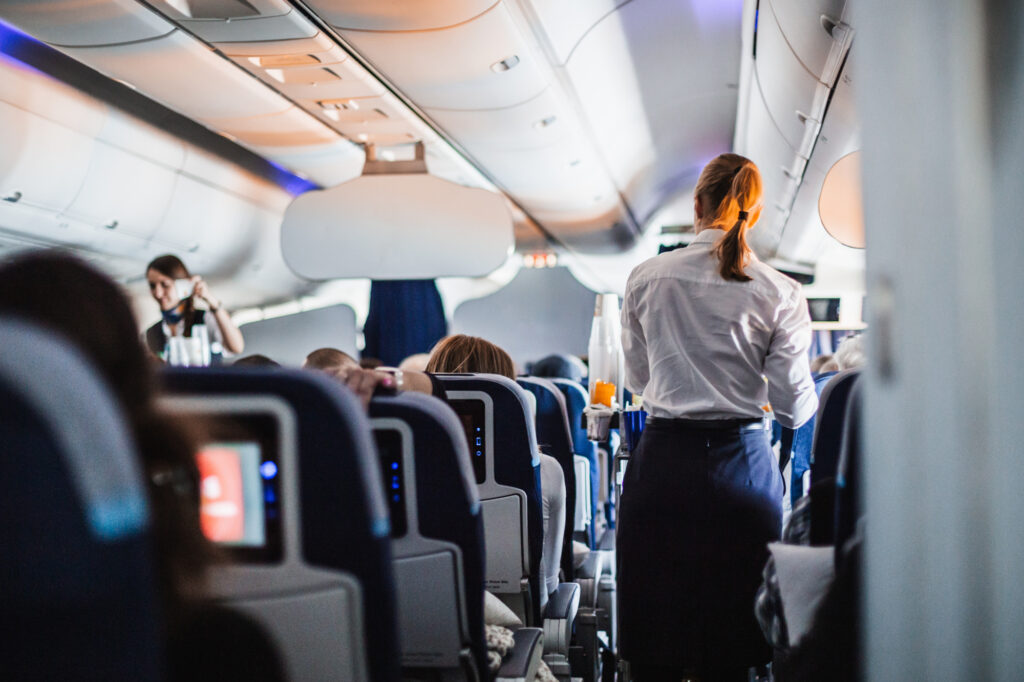Her Harbor Recovery offers a womens-only flight attendant drug and alcohol rehab program that, for many, is a desirable alternative to FADAP. Our specialized therapies and counseling are tailored to the unique issues that women face in addiction and recovery. Our newly renovated 4000-square-foot home is nestled on a private acre surrounded by lush greenery. Her Harbor is more than just a treatment center; it’s a family, a haven, and a serene oasis dedicated to the well-being of women.
Flight attendants face a tough job with constant travel, irregular hours, and high stress, often leading them to use substances as a way to cope. The pressure to stay alert and composed at all times, combined with the fear of professional repercussions, can make it hard for them to seek help. The aviation industry’s culture of perfectionism adds to their anxiety, pushing some to turn to alcohol or drugs to manage stress and sleep issues, which can quickly lead to addiction.
Specialized treatment is crucial for flight attendants dealing with these unique challenges. While programs like FADAP exist, not every flight attendant finds them suitable. Her Harbor Recovery offers a FADAP alternative, a personalized treatment that provides holistic, comprehensive support to help flight attendants achieve lasting recovery.
What Is FADAP?
The Flight Attendant Drug and Alcohol Program (FADAP) is a specialized initiative that is sponsored by airlines and unions. And despite its many benefits, FADAP may not be the best fit for every flight attendant. Some may find the program too rigid or may prefer a more individualized approach to treatment. Others might have concerns about confidentiality or feel that FADAP’s offerings don’t fully address their specific circumstances, such as co-occurring mental health disorders or family obligations. In these cases, seeking an alternative to FADAP like the one offered by Her Harbor Recovery may be a more appropriate choice.

Why Consider Addiction Treatment Alternatives to FADAP?
While FADAP is an excellent resource for many flight attendants, it’s important to recognize that it may not be the right solution for everyone. One of the main reasons flight attendants might seek alternatives is the desire for a more personalized approach to treatment. FADAP, while comprehensive, follows a structured format that may not accommodate the specific needs of every individual.
Another factor to consider is confidentiality. Although FADAP is designed to be discreet, some flight attendants may still have concerns about privacy. They might worry about the potential impact on their careers if their struggles with substance abuse become known within their professional circles.
Additionally, flight attendants with co-occurring mental health issues might find that FADAP’s offerings are not sufficient to address their needs. Conditions such as depression, anxiety, or PTSD often accompany substance abuse and require specialized treatment that may not be fully integrated into FADAP’s program.
Lastly, some flight attendants with addiction struggles may simply prefer a different approach to treatment than the one offered by FADAP. They might seek a facility that offers holistic therapies, an all-woman environment, or a program that aligns more closely with their personal beliefs and preferences.
Why Choose Her Harbor Instead of FADAP?
Consider the following ways in which our program differs from FADAP:
An Environment Designed By Women, For Women: Being in a single-gender environment can minimize distractions that can sometimes be present in a coed rehabilitation center. At Her Harbor, we also know that some of our clients may have a history of trauma associated with men and our primary purpose is to create a space where she will not only heal from her past but be protected from future distressing events. The all-female environment provides a sense of comfort and security, making it easier to talk openly about topics that might be too sensitive to discuss in a coed setting.
A More Personalized Approach to Treatment: Her Harbor Recovery Center provides specialized therapies and counseling tailored to the unique issues that women face in addiction and recovery. No two women come in with the same story and we understand that each of our client’s situations will vastly vary. Each and every client’s care plan is understood and addressed by her own specific needs. By not having a one-size-fits-all approach in our flight attendant drug and alcohol program, we are certain that we can more effectively serve each individual accurately and thoroughly.
A More Confidential & Private Treatment Environment: Her Harbor Recovery offers a confidential and private treatment environment where clients can focus on their recovery without the fear of professional repercussions.
Treatment that Doesn’t Leave Mental Health Concerns on the Table: At Her Harbor, we understand the intricate link between mental health issues and substance abuse, so we provide comprehensive care designed to address both aspects simultaneously—an approach that has been proven to be more effective than addressing them separately.
A Wider Range of Treatment Options: We specialize in a range of dual diagnosis treatment services, including individual and group therapy, medication management, cognitive-behavioral therapy (CBT), dialectical behavior therapy (DBT), trauma-informed care, and holistic therapies such as yoga and meditation. These services are tailored to address the complexities of each woman’s diagnosis, ensuring a personalized approach to recovery.


What to Expect During our Flight Attendant Drug And Alcohol Rehab Program
Embarking on a journey of recovery can be an overwhelming experience, especially for flight attendants who are accustomed to a fast-paced and high-pressure environment. We aim to make this transition as smooth and supportive as possible. Here’s what you can expect during your time with us.
Comprehensive Assessment and Personalized Treatment Plan
The first step in our flight attendant drug and alcohol program is a thorough assessment to understand your specific needs and challenges. This assessment is conducted by our team of experienced female professionals who specialize in addiction treatment for women. We take into account your substance use history, mental health status, lifestyle factors, and any co-occurring disorders. This detailed evaluation allows us to create a personalized treatment plan that is tailored to your unique circumstances.
Your treatment plan will be designed to address both the physical and psychological aspects of addiction. We believe in a holistic approach to recovery, which means that we focus not only on detox and therapy but also on your overall well-being. This includes addressing issues such as stress management, sleep patterns, and emotional regulation, which are particularly important for flight attendants. Our goal is to help you develop healthy coping mechanisms that you can carry with you into your professional life.
Medical Detox and Withdrawal Management
For many flight attendants, the journey to recovery begins with medical detoxification. This process is crucial for safely managing the physical symptoms of withdrawal that occur when you stop using drugs or alcohol. At Her Harbor Recovery, our medical detox program is overseen by a team of healthcare professionals who are experienced in managing withdrawal symptoms. We provide 24/7 monitoring to ensure your safety and comfort during this critical phase of treatment.
Our detox program is designed to minimize discomfort and reduce the risk of complications. We use evidence-based protocols to manage withdrawal symptoms and provide medication-assisted treatment when necessary. Throughout the detox process, our team is there to support you, offering both medical care and emotional support to help you navigate this challenging time. Once detox is complete, you’ll be ready to move on to the next phase of your recovery journey.
Individual and Group Therapy Sessions
Therapy is a cornerstone of our flight attendant rehab. We offer a combination of individual and group therapy sessions to help you address the underlying causes of your addiction and develop strategies for maintaining long-term sobriety. Our therapists are trained in a variety of therapeutic modalities, including cognitive-behavioral therapy (CBT), dialectical behavior therapy (DBT), and trauma-informed care, all of which are tailored to the specific needs of flight attendants.
Individual therapy sessions provide a safe space for you to explore your personal challenges and work on the issues that may have contributed to your substance use. During these sessions, you’ll work one-on-one with a therapist to develop a deeper understanding of your addiction and learn new ways to cope with stress and triggers. Group therapy sessions, on the other hand, offer the opportunity to connect with others who are going through similar experiences. Sharing your story and hearing from others can be incredibly powerful, fostering a sense of community and support.
Holistic Therapies and Wellness Activities
At Her Harbor Recovery, we believe that recovery is about more than just abstaining from drugs or alcohol—it’s about healing your mind, body, and spirit. To support your holistic well-being, we offer a range of complementary therapies and wellness activities as part of our Flight Attendant Drug and Alcohol Rehab Program. These activities are designed to help you relax, de-stress, and reconnect with yourself during your recovery journey.
Our holistic offerings include yoga, meditation, art therapy, and fitness programs, all of which are tailored to the needs of flight attendants. These activities are not only therapeutic but also help you develop healthy habits that you can incorporate into your daily life. Whether you’re learning new ways to manage stress through meditation or finding creative expression in art therapy, these holistic therapies play a vital role in your overall recovery.
Aftercare and Continuing Support
Recovery is an ongoing process, and we’re committed to supporting you long after you leave our facility. Our aftercare program is designed to help you transition back to your daily life while maintaining your sobriety. We offer a range of continuing support options, including ongoing therapy sessions, support groups, and relapse prevention planning. These resources are tailored to the unique challenges faced by flight attendants, ensuring that you have the tools and support you need to succeed in your recovery.
In addition to traditional aftercare services, we also offer specialized programs to help you navigate the specific challenges of returning to your career. This includes stress management workshops, sleep hygiene education, and strategies for maintaining a healthy work-life balance. Our goal is to equip you with the skills and confidence you need to thrive both personally and professionally as you move forward in your recovery journey.
By choosing Her Harbor Recovery, you’re not just getting a treatment program—you’re gaining a partner in your recovery. Our team is here to support you every step of the way, providing the care, compassion, and expertise you need to achieve lasting sobriety and a brighter future.
Get Started Today
FAQs About Flight Attendant Drug & Alcohol Rehab
How long does the Flight Attendant Drug and Alcohol Program (FADAP) typically last?
While we can’t speak for FADAP, our residential flight attendant drug and alcohol program often lasts between 30 – 90 days. Some flight attendants may require longer treatment to fully address their substance use and any co-occurring mental health issues. During your initial assessment, we’ll work with you to determine the most appropriate length of stay. We also offer outpatient programs for those who do not need a residential stay. Our priority is to provide you with a treatment plan that gives you the best chance for a successful recovery–but one that isn’t overkill, either.
Can I maintain contact with my employer during the program?
We understand that as a flight attendant, maintaining contact with your employer can be important, especially if you have ongoing responsibilities or need to manage leave arrangements. At Her Harbor Recovery, we offer a flexible approach that allows you to stay in touch with your employer as needed. This can include making phone calls, sending emails, or coordinating with your employer regarding your progress. Our team is here to support you in managing these communications discreetly, ensuring that your privacy is upheld while you fulfill any necessary obligations. We’ll work closely with you to ensure that your treatment does not interfere with your professional responsibilities, while also prioritizing your recovery.
Are family visits allowed during the rehab program?
Family involvement is an important part of the recovery process, and we do allow family visits during the rehab program. We recognize that support from loved ones can be crucial to your healing journey, and we encourage healthy family interactions as part of your treatment. Our program includes scheduled family therapy sessions where your loved ones can participate, helping to rebuild trust, improve communication, and address any family dynamics that may have contributed to your substance use. We believe that involving family in your recovery can enhance your support system and provide you with a stronger foundation for long-term sobriety. We’ll work with you to arrange visits that align with your treatment plan and recovery goals.
Will my participation in the program affect my flight status or certifications?
Her Harbor Recovery is committed to ensuring that your participation in our drug and alcohol rehab for flight attendants does not negatively impact your flight status or certifications. We understand the importance of maintaining your professional credentials, and we work closely with you to manage any necessary documentation or communication with relevant authorities. Our program is designed to be as confidential as possible, and we take great care to protect your privacy throughout the treatment process. In many cases, participation in a recognized treatment program can be viewed positively by regulatory bodies, as it demonstrates a commitment to addressing substance use issues responsibly. We’ll support you in navigating any professional concerns and help ensure that your career is safeguarded while you focus on your recovery.